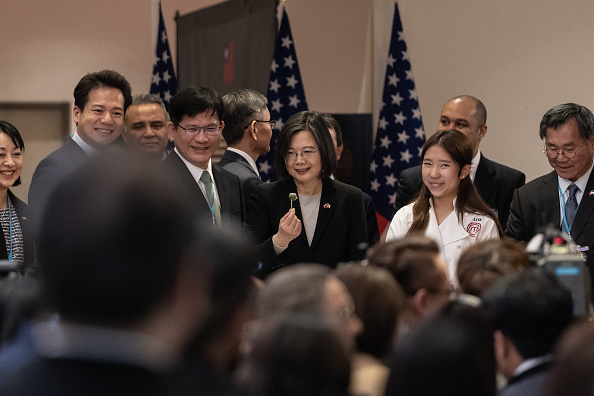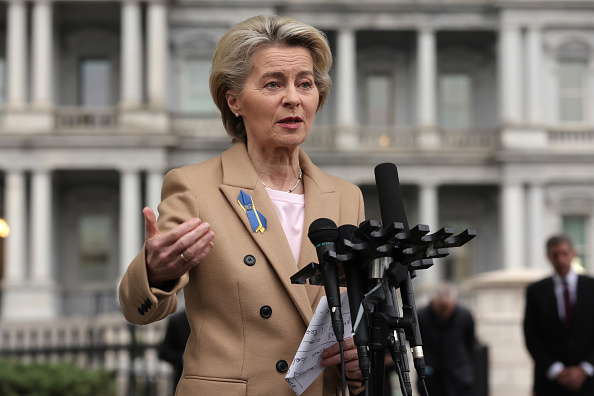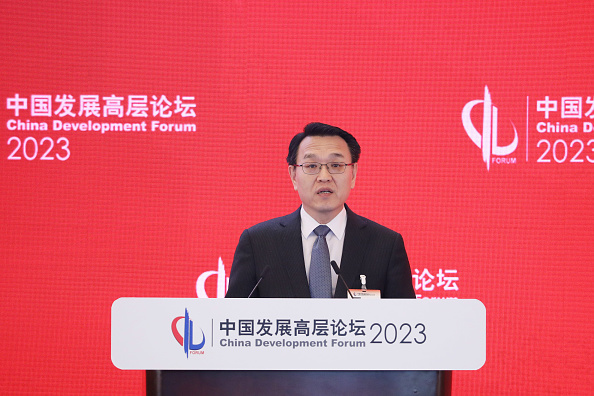
 Tsai in Transit
Tsai in TransitAmid increasing tensions over the Taiwan Strait between Beijing and Washington, Taiwan leader Tsai Ing-wen arrived in the U.S. on Wednesday and is expected to meet with House Speaker Kevin McCarthy next week.
Tsai is stopping in both New York and Los Angeles on "transit visits" before and after formal visits to Central America. It will be Tsai's first time in the United States since the COVID-19 pandemic, but her seventh as Taiwan's leader. Tsai framed her trip as an attempt to show Taiwan's commitment to democratic values on a global level.
If it happens, McCarthy will be the highest-ranking U.S. official to meet with a Taiwanese leader on American soil, and China has warned it could lead to a "serious confrontation" in U.S.-China relations.
The Biden administration is playing down Tsai's visit and trying to keep an already soured relationship with China from getting any worse.
Analysts have noted that Beijing has made their stance clear, sending nine Chinese aircrafts to cross the Taiwan Strait's median line to carry out combat readiness patrols.
"We resolutely oppose this and will definitely take measures to respond," said Zhu Fenglian, spokeswoman for China's Taiwan Affairs Office.
Former House Speaker Nancy Pelosi visited Taiwan last year, which also drew strong rebukes from China. In response, the People's Liberation Army staged military exercises in the area within days and, for the first time, fired ballistic missiles over Taiwan.
Meanwhile, Taiwan's previous leader Ma Ying-jeou is currently on a 12-day trip across the mainland, where he has called for maintaining exchanges with China. Ma's visit is the first trip to the mainland by a former or current leader of Taiwan in over seven decades.
Learn more in "Conflict is Not Inevitable," an interview with Dr. Michael Swaine, a senior research fellow in the East Asia program at the Quincy Institute for Responsible Statecraft.
 Reevaluating Relationships
Reevaluating RelationshipsIn an anticipated speech on China-EU relations in Brussels this week, head of the European Commission Ursula von der Leyen said that Beijing's stance on Russia's war in Ukraine would determine the future of Chinese-EU ties.
While noting that Europe is not looking to "decouple" from China, the EU chief also suggested that the commission would propose a new "economic security strategy later this year," in efforts to counter what she described as an "increasingly assertive" Beijing.
As part of this, the bloc would consider restricting European companies' investments in China in sensitive sectors like robotics, quantum computing, and artificial intelligence.
Von der Leyen also emphasized that a stalled investment pact between the EU and China was now outdated, suggesting that any moves to revive the Comprehensive Agreement on Investment (CAI) would be unsuccessful.
"We have to recognize that the world and China have changed in the last three years – and we need to reassess CAI in light of our wider China strategy," she said.
But this week, Fu Cong, China's envoy to the EU, also reiterated Beijing's commitment to the stalled CAI, which it sees as an important part of its relations with Europe. He said that there's "no fundamental conflict of interest" between Beijing and Brussels but that China would be open to proposals from the EU, as long as they are based on "equality and mutual benefit."
Additionally, amid growing concern that Chinese leader Xi Jinping is hardening his support for Russia's war in Ukraine, EU leaders are gearing up to reach out to Xi in person. Spanish Prime Minister Pedro Sanchez will head to Beijing next week, and Von der Leyen will accompany French President Emmanuel Macron shortly after.
"We have to be frank on this point. How China continues to interact with Putin's war will be a determining factor for EU-China relations going forward," Von der Leyen said.
Read more in "Is Economic Cold War Back?," by Xiao Bin, Deputy Secretary-general of the Center of SCO Studies.
 Open for Business
Open for BusinessThe China Development Forum was held in Beijing last weekend, providing a platform for China's government officials to reassure foreign companies of its commitment to openness and market reform, particularly amid growing concerns about the regulatory environment and challenges faced by foreign companies operating in China.
Executives from Tesla, Apple, Samsung, and JPMorgan Chase, among other global business leaders, gathered at the forum. While their attendance was deemed a "vote of confidence" in the Chinese market, particularly with some expressing optimism for the future of their operations in China, there are remaining concerns about whether the country can honor its pledges and the evolving geopolitical situation.
During the forum, the government sent a clear message that the country is open for business, highlighting China's progress and commitment to creating a level playing field, simplifying customs procedures, and strengthening intellectual property protection, all of which are vital to attracting more foreign investment and maintaining its position as a global economic powerhouse.
Beijing also called for "consensus and cooperation" to facilitate global economic recovery, and reiterated the intent to "strengthen communication and cooperation with all friends at home and abroad." China's Commerce Minister Wang Wentao also made a statement saying that attendees were "not foreigners, but family."
Experts believe that the international business community is "cautiously reconnecting with China", while remaining vigilant of how the country addresses urgent economic issues such as exports, its real estate market, currency deals, local government debt, and high-tech decoupling.
Prepared by China-US Focus editorial teams in Hong Kong and New York, this weekly newsletter offers you snap shots of latest trends and developments emerging from China every week, while adding a dose of historical perspective.
- 2023-03-24 A Changing World
- 2023-03-17 Peacemaker Xi
- 2023-03-10 Party Time
- 2023-03-03 “An Existential Struggle”
- 2023-02-24 Opposing Worldviews
- 2023-02-17 Ripple Effects
- 2023-02-10 Ballooning Tensions
- 2023-02-03 Hot Air
- 2023-01-27 Spheres of Influence
- 2023-01-20 China's Davos Pitch
- 2023-01-13 Strategic Encounters
- 2023-01-06 Common Challenges
- 2022-12-23
- 2022-12-16 All in On Africa
- 2022-12-09 Seeking Stabilization
- 2022-12-02 Turf Tension
- 2022-11-18 Thawing Ties?
- 2022-11-11 Face to Face
- 2022-11-04 The Pacing Challenge